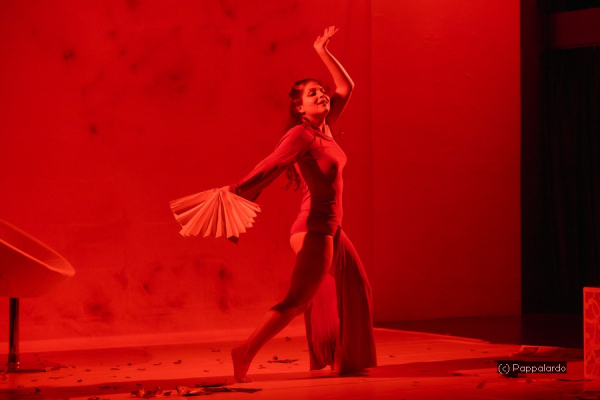
Hanjo (A summer fan) MITEM
Hanjo is based on a 14th-century Noh play by Motohiko Zeami, itself based on an ancient Chinese poem in which a discarded woman is described as a “hanjo,” a summer fan, who is thrown away in the fall.
Performance length: 1 hour(s)
Actors:
Anna Germani, Elisa Bruschi, Alessandro Miano
Director: Mattia Sebastian
Makeup: Elena Tagliapietra
Assistant director: Cinzia Tropiano
Responsible for technology: Cristian Pradella
Graphics: Greta Lamiel Giorgetti
“Young people today do not have a tragic past behind them; but they live in a tiring and tormenting present that is projected onto an uncertain and precarious future. They don't have to pull the threads of a painful past to make sense of it, but they question themselves about their identity in the present and the future that awaits them.” (Yukio Mishima)
Yukio Mishima.
Born Kimitake Hiraoka (1925-1970), Mishima was the author of approximately 40 novels, as well as numerous plays (including in traditional Noh and Kabuki styles), books of short stories, and essays. He has also acted in and directed several films. Many of his works were translated into English and he was nominated three times for the Nobel Prize in Literature. Internationally he was probably the best-known Japanese writer of the 20th century.
Directory notes
Why Hanjo by Yukio Mishima, taken from “Five Modern Noh”? When I choose a theatrical or literary text to bring to the stage I hope that the author, through his compositional work, provides me with an "open field" or "universality" of themes and actions through words, energy, symbols, traditions, contemporaneity, physicality, mystery, love, terror. Mishima, both with the theater and with his immense literary production, dragged me into this "open space" of theatrical research; this happened recently with Heiner Müller (whose "Hamletmachine" and "Medea" I staged) and his texts which are an infinite collection of quotes ranging from Greek theater to the historical contradictions of the post-war period. The Noh theatre, from which Mishima starts to tell us the story of Hanjo, and the Greek theater are very different, but the matrix remains the same: the lack of compassion, the terror, the waiting, the request for justice, the 'Love. Theater remains the means to show us the dark mystery that is the human being.

